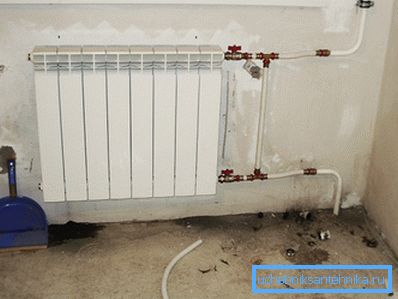Aluminum radiators - a modern solution for your home
For several years now, in the modern market of heating devices, new aluminum radiators have been successfully competing with classic cast-iron and steel representatives. For those who still doubt the effectiveness of these lightweight units, we present a small overview of the structures of aluminum radiators and their main technical characteristics.
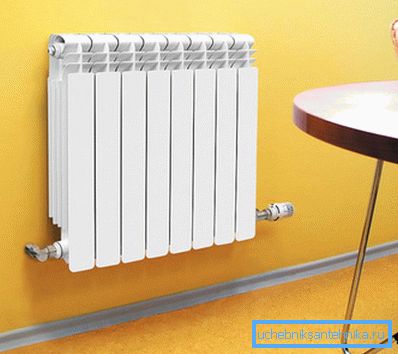
Advantages and disadvantages of aluminum radiators
Made from aluminum - lightweight, easy to process and fusible metal with excellent heat dissipation, radiators are endowed with a large number of characteristic advantages:
- Low weight (especially compared to cast iron products), which facilitates and reduces the cost of loading / unloading, delivery and installation.
- High heat dissipation with modest dimensions.
- The ability to heat up over a short period of time.
- Easy heat control.
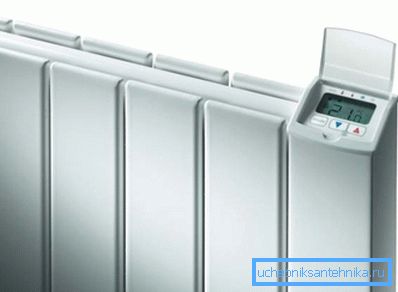
- Excellent balance - heat output and price.
- Aesthetic appearance.
- The resistance of the powder coating to the effects of aggressive external environment. Does not require repainting for the entire period of operation.
- Heating by convection prevents the accumulation of dust in the intersectional space.
- Easy to do it yourself. This will help a simple instruction manual device, which is usually attached to the product.
The characteristic disadvantages of aluminum batteries are:
- Fear of water hammer that can damage the structure. To combat this lack of aluminum radiators, manufacturers increase the working pressure to 16 atmospheres.
- The need for water treatment. Low quality heat carrier or unsuccessfully prepared coolant may cause electrochemical corrosion of the instrument. In order to prevent premature failure in such structures, a polymer coating is applied to the inner surface.
Attention! In particular, the risk of corrosion relates to centralized heating systems, where it is almost impossible to influence the qualitative composition of the coolant.
Aluminum radiators are offered for sale usually in classic white color, in harmony with any interior solution.
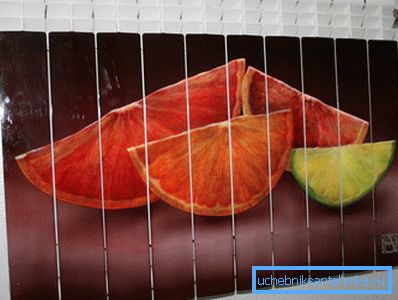
Note! By the individual order, the devices can be painted in any color or applied in accordance with the wishes of the client. The coating applied in the factory will last as long as the device itself.
Based on the foregoing, it can be argued that aluminum heaters are more suitable for installation in private homes, where it is easier to follow:
- The condition of the coolant.
- No overload when starting the heating system.
In addition, when connecting aluminum radiators to the piping of the heating system, contact with copper and steel, provoking electrochemical corrosion, should be avoided.
To eliminate this situation, use special traffic jams:
- Nickel plated.
- Cadmium plated.
- Chrome plated.
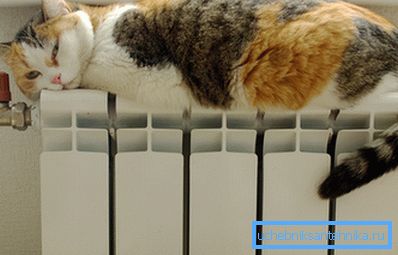
Variety of aluminum radiators
The range of aluminum batteries on the market of heating equipment is wide and diverse.
They can be classified according to three criteria:
- Manufacturing method
- Main technical characteristics.
- Dimensions.
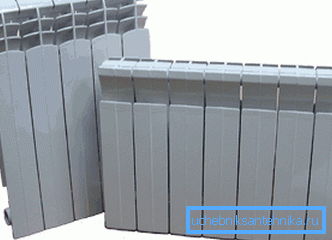
Production method
Depending on the production method, aluminum heating devices are divided into manufactured:
- The casting method is made each section separately.. Casting is performed at elevated pressure from aluminum with the addition of silicon (no more than 12%) to increase strength. Then separate sections are connected in one device (usually in 10 sections).
- The extrusion method is used to manufacture vertical parts. The collector is cast from silumin (aluminum plus silicon). Next, the radiator is assembled by pressing.
Note! Radiators made by extrusion cannot be further regrouped (remove and add sections).
- Anodized. Radiators of this type are made of high-quality, purified aluminum. When anodic oxidation occurs, changes in the structure of the metal, as a result of which such radiators are practically not susceptible to corrosion.
Main factors
The main characteristics of aluminum radiators are within:
| Center distance (between upper and lower headers) | from 200 to 500 mm |
| Operating pressure | from 6 to 16 atm |
| Thermal power | from 82 to 212 watts |
| Weight of one section | from 1 to 1.47 kg |
| Capacity of one section | from 250 to 460 ml |
| Maximum temperature of the heat carrier | 110 degrees |
| Warranty period | from 10 to 15 years |
Dimensions of aluminum heating devices are presented by different manufacturers also for every taste:
- Height - 245, 395, 407, 415, 430, 580, 577, 545 mm, etc.
- Depth - 80, 90, 95, 97, 100 mm.
- Section width - 80 mm.
Well-chosen aluminum radiators will last longer if you follow the rules for installing and connecting radiators.
Conclusion
We hope that the above information will be useful to you when choosing heating devices for your apartment and country house. As for the installation process, which we have kept silent about, it will not require any special skills from you, it is enough to get a wrench and install sheds in advance.
In this case, the supply and discharge of water should be properly prepared, but if you have never done plumbing work, you should entrust it to professionals. In the presented video in this article you will find additional information on this topic.
